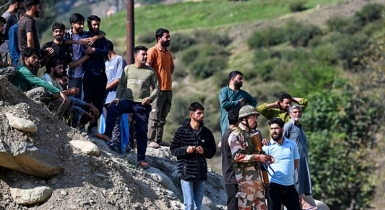
There is no denying the fact that Russia's war in Ukraine, in many ways, are the prime causes of piling up major commodity prices in emerging nations across the globe, where governments struggle to keep energy flowing to citizens hit by surging inflation. Meanwhile, a number of governments are triggering rolling blackouts and boosting power bills because they can no longer secure enough fuel. Mexico's government has, though, bolstered subsidies to cushion residential electricity costs. Here in Bangladesh, shops are closing at 8pm including hour-long load shedding continues in residential areas at as part of energy austerity measures,
Noted Economist of the country, Dr Debapriya Bhattacharya, last week at a programme called for a 'transitional policy understanding' to overcome the ongoing financial turmoil prevalent in the country's economy. According to him the main villain of the economy is the weakness of the financial sector, where the lack of reforms have accumulated in a great way, as such the effects are now visible. In this situation, a country like Bangladesh, is unable to move ahead without a transitional policy.
The distinguished fellow of think tank Centre for Policy Dialogue (CPD), made the remarks at a media conversation with economic reporters on "Overcoming the Current Economic Challenges - Towards a Transitional Policy Understanding."
Dr Debapriya expressed his belief that the current crisis is only a symptom of the disease as such the government has to reduce the subsidy to deal with the crisis in the financial sector in order to protect poor people in all strata of the society to control the ongoing inflation in the economy.He said Bangladesh's economy is yet to go back to the pre-COVID benchmark and experiencing fragmented recovery and macroeconomic stability is under high stress, particularly due to inflationary pressure and unstable foreign exchange rate with the local currencies. Moreover, the global economy's prospects for FY23 --commodity price rise, supply chain disruption, and logistic, increase in transportation cost - are all worse for Bangladesh economy, he argued.
Under the current situation, the economy needs a transitional policy understanding for a period of 2-3 years to overcome the uncertainties at both domestic and global arena, necessary for short-term stabilization and consolidation of the economy. The standing scenario in the country exhibits that the export-Import deficit of USD $33.25 billion, the current account deficit of $18.70 billion, and the overall external deficit of $5.38 million which are the symptoms of the disease, the CPR fellow specially mentioned.
It is fact that the revenue share in GDP did not go up more than 10 per cent of GDP, the share of income and asset tax in total revenue stagnated at around 30 per cent, and the budget deficit was increasingly being funded by borrowing from banks, all are the elements of fiscal mismanagement. while replying to a query, he mentioned about the recent fuel oil price hike, which he termed disagreeable and imprudent, as this way Bangladesh economy will not be benefited from this move in the current context domestic economic situation.
Debapriya pointed out that the government has cut subsidies in the oil sector, which are now diverted to pay the capacity charge of rental power plants. On the other hand, he urged to increase the interest of bank lending to 12 per cent for moderate credit growth, and protect depositors, increasing its rate to 8-9 per cent. He also called for ending the direct central bank's interference in fixing the exchange rate, rather it should be fixed by the competitive market rate.
UNB reported that in reply to another query of the media one of the top economists of the country Dr Debapriya Bhattacharya was of the opinion that people of Bangladesh will pay revenue eagerly when they can see transparency and adaptation in government expenditure including procurement,
In the context of the pre-COVID benchmark and experiencing fragmented recovery, when the macroeconomic stability is under high stress, mainly due to high inflationary pressure and unstable foreign exchange rate with the local currencies marked by serious price hike of almost all essential commodities, the relevant government functionaries have to take pragmatic policy directives affecting adequate reformation and activity package to face the mounting crises in the socio-economic domain in the country.
The writer is a Senior Journalist and Media Analyst, writes mainly on Promoting Knowledge Based Society, Socio-Economic Transformation, Rule of Law, Human Rights & Good GovernanceDercon contends in his book Gambling on Development that the government had no "grand design" in any of this. Instead, it stayed out of the way. For instance, it abstained from destroying the budding textile industry and allowed NGOs to operate freely. It is true that Bangladesh has expanded by using its own inexpensive labour, often at awful costs. The Rana Plaza catastrophe of 2013 resulted in the death of over 1,000 garment workers. However, every industrialising nation has seen similar horrors, from Britain with its filthy Victorian slums to Japan with its Minamata mercury poisoning catastrophe.
The success of Bangladesh's development, according to Charlie Robertson, chief economist at Renaissance Capital, can be attributed to three things. Economists prefer threes. Heis ones are electricity, fertility, and literacy. In his book, "The Time Travelling Economist", he makes the case that Bangladesh meets all three requirements for industrial take-off: adult literacy rates of at least 70 percent, an electrical supply of at least 300 kWh per person, and a fertility rate of no more than three children, says the opinion piece.
Many African nations have literacy rates above 70 percent, providing them with a ready-made labour base for factories. But just a few nations can deliver dependable electricity at affordable prices. The majority fall short of Robertson's 300 kWh barrier, ranging from Guinea Bissau (21 kWh per person) to Ethiopia (82 kWh) and Nigeria (150 kWh).
It is debatable if Robertson is correct when he insists that nations cannot develop until the fertility rate falls below 3. However, he asserts that there is a direct link between family size, household savings, and the accessibility and cost of bank loans for industry. Compared to Nigeria 12percent Bangladesh has a rate of loans to GDP that is 39 percent higher. Compared to Nigeria's 5.2, it has a fertility rate of 2.
Botswana, Mauritius, Morocco, and South Africa are among the African nations with fertility rates under 3. They are among the richest in the continent. Though the reason can be questioned, there is a significant link. The fertility rates in the rest of Africa range from Niger, one of the world's poorest countries, with a fertility rate of 6.7, to Kenya, a middle-income country with a fertility rate of 3.4, reads the FT article.
Bangladesh is now where South Korea was in 1975, just before it experienced a miracle. Robertson's conditions for lift-off are met or virtually met by a number of African nations. Governments that are upright and progressive surely assist. However, Bangladesh demonstrates that there is also a haphazard route to riches.
In the context of the financial analysis, the above flashed relevant functionaries of the government have to take emergency measures to arrest deteriorating conditions in the socio-economic and political front, they are to take a pragmatic solutions bin order to find out ways and means to resolve the crises so that the country can overcome the darkness *to cross the long dark tunnel to see the light at its end" .
The writer is a Senior Journalist and Media Analyst, writes mainly on Promoting Knowledge Based Society, Socio-Economic Transformation, Rule of Law, Human Rights & Good Governance.





































